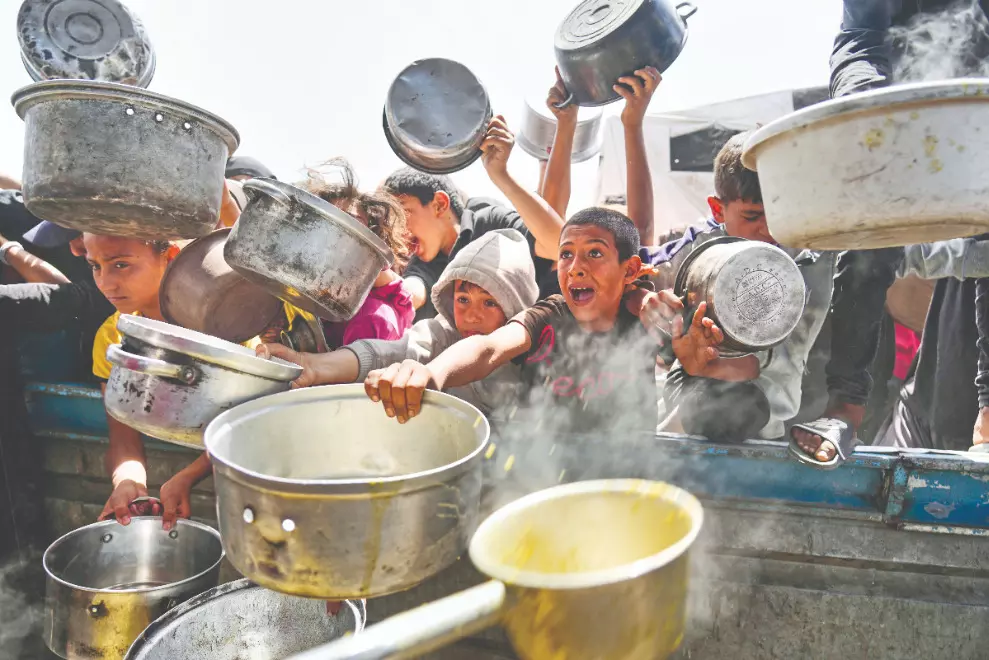UN declares famine in Gaza

Gaza City (Gaza Strip): The United Nations on Friday officially declared a famine in Gaza, marking the first such determination in West Asia. The announcement came amid warnings that roughly 500,000 residents of the Palestinian territory are facing “catastrophic” levels of hunger.
“It is a famine: the Gaza famine,” said Tom Fletcher, the UN’s emergency relief coordinator, attributing the crisis to what he described as “systematic obstruction” of aid deliveries.
The Integrated Food Security Phase Classification Initiative (IPC), a UN-backed coalition of monitors tasked with identifying food crises, concluded that famine is now gripping Gaza City. Without a ceasefire and the removal of restrictions on humanitarian aid, the situation is expected to worsen and spread to areas including Deir al-Balah and Khan Younis by the end of next month.
“The evidence indicates that all thresholds for famine—starvation, acute malnutrition, and mortality—have been met in Gaza City,” the IPC report stated. It added that a third of Gaza’s population could face catastrophic hunger by September, noting that this figure is likely an undercount. Israeli Prime Minister Benjamin Netanyahu strongly rejected the UN’s declaration, calling it “an outright lie.” Israel’s foreign ministry described the report as “based on Hamas lies laundered through organisations with vested interests” and insisted, “There is no famine in Gaza.” The Israeli military’s Coordinator of Government Activities in the Territories (COGAT) echoed this view, saying Friday that significant steps have been taken to expand aid deliveries. Nevertheless, UN officials and local residents maintain that the current supply of food and medical assistance falls far short of needs.
Chris Newton, an analyst with the International Crisis Group, said, “A rapidly increasing number of people, especially young children, are dying preventable deaths from starvation and disease because Israel made starvation a core part of its campaign to control the strip.”
Netanyahu has argued that military pressure is necessary to free hostages held by Hamas and to neutralize the militant group. However, humanitarian experts warn that plans to escalate operations in Gaza City will likely worsen the famine.
Formal famine determinations are rare. The IPC has previously declared famines in Somalia, South Sudan, and Darfur. According to IPC criteria, a famine exists when at least 20 per cent of households have an extreme lack of food, 30 per cent of children aged 6 months to 5 years suffer from acute malnutrition, and mortality exceeds two adults or four children per 10,000 per day due to starvation or related disease.
Access to Gaza has made data collection difficult, yet the July–August analysis indicates that starvation and acute malnutrition thresholds have been surpassed. Alex de Waal, executive director of the World Peace Foundation, noted, “Had Israel allowed the IPC better access to collect data, a famine might have been determined months ago, raising global awareness sooner.”
Gaza’s population, previously estimated at around 700,000 in the city alone, has endured repeated bombardments and displacement. Neighborhoods have been largely destroyed, and many families returned during a ceasefire earlier this year.
Doctors report a surge in malnutrition-related illnesses. Kirsty Blacka, an Australian emergency nurse who worked at Al-Quds hospital through June, described seeing emaciated patients with no prior health conditions. “Because of the starvation, it will put extra strain on already depleted bodies and will lead to the death of many of the Palestinians,” she said.
Families are witnessing severe weight loss among children recovering from injuries. Yousef Sbeteh said his two teenage children, injured in an Israeli airstrike in June, have lost 15–20 kilograms while hospitalized due to insufficient food. “Doctors say she needs protein, meat and fish,” he said, referring to his daughter. “But I can’t provide that now.”
The IPC report underscored that fighting, aid blockades, widespread displacement, and the collapse of food production are pushing Gaza’s population toward life-threatening levels of hunger. Without an immediate humanitarian intervention, experts warn the crisis could deepen, affecting hundreds of thousands more across the territory.



